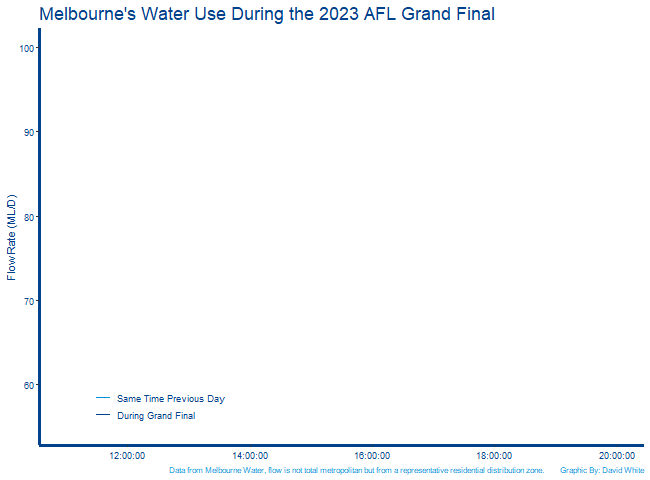
Melbourne Water Observes Average Flushes Comparison during 2023 AFL Grand Final between Collingwood and Brisbane Lions
Collingwood's heart-stopping four-point triumph win over Brisbane in the AFL Grand Final on Saturday captivated fans across the nation. While all eyes were fixed on the thrilling clash between the two top teams, Melbourne Water, monitored water usage patterns throughout the sporting event.
The findings revealed a fascinating correlation between collective behaviour and water consumption during the high-profile match leaving spectators on the edge of their seats until the final siren.

The flush factor, coined by Melbourne Water, refers to the surge in water usage observed during critical moments of the AFL Grand Final. The study shows a comparative increase (to same time previous day) in toilet flushes during halftime, breaks between quarters, and after each goal or behind scored.
However, despite Collingwood's remarkable victory, it was not enough to surpass the historic cliff hanger that saw Collingwood tie with St. Kilda (draw) in 2010 (50.8%). That match witnessed the highest recorded increase for Collingwood in simultaneous water use of toilets immediately after the final siren.
While Collingwood's thrilling victory on Saturday may not have achieved the same level of toilet water usage (27.6%), their success on the field cannot be understated. The team's dedication, skill, and strategic plays were evident throughout the match, securing their well-deserved triumph over Brisbane.
Here are the Top 17 AFL Grand Finals with the Highest Flush Factor (percentage increase in water usage):
- Western Bulldogs def Sydney Swans in 2016 - Flush Factor: 101.0%
- Collingwood def St Kilda in 2010 [Draw] - Flush Factor: 50.8%
- Sydney Swans def Hawthorn in 2012 - Flush Factor: 38.8%
- West Coast Eagles def Collingwood in 2018 - Flush Factor: 36.0%
- Geelong def St Kilda in 2009 - Flush Factor: 35.0%
- Hawthorn def Geelong in 2008 – Flush Factor: 30.0
- Richmond def Adelaide in 2017 – Flush Factor: 29.0%
- Hawthorn def Fremantle in 2013 – Flush Factor: 29.0%
- Geelong def Collingwood in 2011 – Flush Factor: 28.4%
- Melbourne def Western Bulldogs in 2021 – Flush Factor: 27.9%
- Collingwood def Brisbane in 2023 – Flush Factor: 27.6%
- Richmond def Geelong in 2020 – Flush Factor: 25.5%
- Collingwood def St Kilda in 2010 – Flush Factor: 17.7%
- Hawthorn def West Coast in 2015 – Flush Factor: 16.4%
- Hawthorn def Sydney Swans in 2014 – Flush Factor: 15.9%
- Richmond def GWS in 2019 – Flush Factor: 13.0%
- Geelong def Sydney in 2022 – Flush Factor: 8.4%
This grand final match will undoubtedly be remembered as a thrilling contest, showcasing the best of Australian Rules Football. According to Melbourne Water’s Water Operations Centre Lead, Dave White, this discovery of ‘the Flush Factor’ adds a new dimension to the AFL Grand Final, as it highlights the impact of collective behaviour on water demand and usage.
With millions of passionate fans glued to their screens or attending the live event, the flush factor illustrates how small individual actions can contribute to significant water usage on a larger scale.
Melbourne Water is urging all spectators and viewers to be mindful of their water consumption as we approach the warmer months. By adopting simple water-saving practices, such as using water-efficient toilets and limiting water use, every individual can contribute to sustainable water management and conservation efforts.
"We believe that raising awareness about the flush factor during major sporting events is crucial," said Mr. White. "By highlighting the impact of collective behaviour on water usage, we hope to encourage fans to make conscious choices and contribute towards a more sustainable future."
Melbourne Water's study serves as a reminder that while the AFL Grand Final captivates the nation's attention, it is essential to consider the broader implications of our actions. By recognising the flush factor, we can collectively work towards responsible water usage and contribute to a more sustainable and environmentally conscious community.
For media enquiries, please contact:
Sandra Aloi, Senior Media Advisor
03 9679 7004
[email protected]



